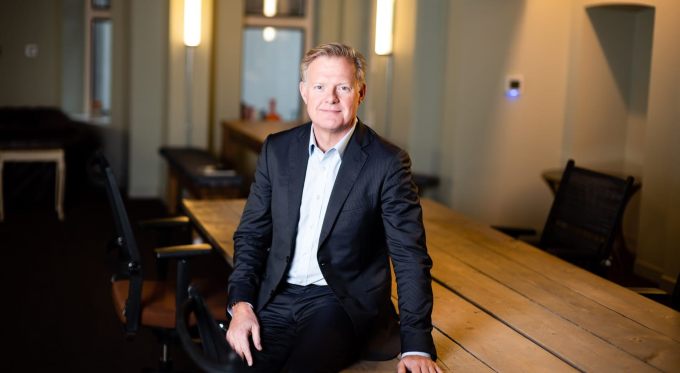EXCLUSIVE: Simon Calver is best known for his seven-year tenure as CEO of LOVEFiLM, one of the successes of the UK venture capital, which was sold to Amazon in 2011 and became Prime Video.
He went on to become CEO of Mothercare, working on turning the venerable high-street brand around.
Prior to LOVEFiLM, Simon Calver worked at multinationals such as Unilever, led PepsiCo in the UK, and was general manager at Dell.
Until June 2020, Calver was head of earlier-stage investments at the Business Growth Fund.
Today, Simon Calver advises and invest in technology and e-commerce businesses and is also a public speaker on business change, the digital revolution and leadership.
Here, Simon Calver tells Sophie Wheeldon why he believes in the power of the small company, how crucial it is to embrace technology and how the pandemic is going to change the way we work forever.
As the former CEO of Mothercare, you led a global turnaround – what was the biggest change you made to the company?
I think the biggest change when you turn a company around is actually trying to give people internally the confidence they need to make the turnaround happen. And like any business, it’s about people and what they do on a day-to-day basis.
So giving people confidence, a vision of the change you need to make and real purpose, will ultimately make the difference.
I mean, the trading conditions in the UK were incredibly challenging globally. We had a very strong business, but a few years after I left, Mothercare didn’t survive.
I’m hoping the people I worked with see the transition that they went through with me as hugely positive, for what was a 50-year-old brand and company at the time.
During your seven-year tenure at LOVEFiLM, which professional achievement are you proudest of?
I think the first thing would be the team we assembled, which was more like a family. We bickered, we argued, but that’s the beauty of a start-up in the early stages.
I think the biggest change we faced was the transition from a physical DVD rental business to a digital streaming business. And we had to do that at the same time as running a business and driving efficiencies.
Within a two-to-three-year period, we became leaders of the streaming industry, which was the main reason why Amazon ultimately acquired us. We were the technology behind Amazon Prime.
So, I think making that transition to digital from physical was my proudest achievement.
Why is it important for businesses to capitalise on the latest technological opportunities?
The key thing about technological change is that it allows new companies to grow.
And I’m a huge believer in the power of the small company, rather than the power of the big company. These innovators have less capital, maybe have fewer people, but are nimbler than a lot of the incumbents.
I think large companies and small companies need to grab hold of technological opportunities to understand what’s happening with their customers, with their clients and to ensure they’re not going to be cannibalised by new technology.
It’s important that all levels from the board downwards really understand the impact technology will have on their business.
‘The relationship with work and how people work is going to change quite a lot as a result of the pandemic’
How has the Covid-19 pandemic impacted the world of work, and do you believe that such trends as remote working are here to stay?
The answer is yes, I do. I think we’re going to be more flexible; I think when people in the future are looking for jobs, they may look for remote working, hybrid working and office working, and then they’ll make that call as to the type of job they want to do.
Clearly, we’re going to see a huge surplus of commercial office space as people cut back. I’m sure we will creep back into the offices slowly over the next few years, but I think people are questioning whether having a two-hour commute each way is worthwhile when they are just as efficient at home. So I think people are going to challenge that.
The other thing, I think people are looking for more purpose.
It’s been an incredibly stressful time. It’s been a time of constant change. And in their work, I think people are looking for a real purpose and vision. The companies that can provide a real reason as to why they’re in existence will attract great talent.
If a business is just a transactional service company that doesn’t actually add much value, I don’t think people will be attracted to it as much.
I think the relationship with work and how people work is going to change quite a lot as a result of the pandemic.
You are a keen rower; why is it important to have a work/life balance and how do you divide your time?
If you ask my kids, they will probably say I haven’t got it as right as they would like, for sure.
But I think the key thing is to find time for you during your career because we function better as people if we’ve got that balance. I know in any stage of a career, sometimes you feel the need to burn the candle at both ends. But ultimately, I think you have to grow as an individual and a person.
I’ve learnt so much in the last 18 months from people who have rowed the Atlantic, understand navigation or understand marine biology. And those are areas that I never thought I would learn about; it has opened my eyes to how amazing the world is.
I think it makes you a better person and ultimately a better, more balanced manager for people to work with.
What is the next step in your career?
It’s always hard to work out exactly what your next step is and inevitably, if you make a plan, you have to change it.
I thoroughly enjoyed supporting great teams and working with great companies. And so, I’m going to continue to do that on a non-executive basis, chairing a number of companies.
But also, I’m doing executive coaching programmes to become a better coach for people, too, because I think we must all reach our full potential. And that requires having mentors and coaches to support us in that journey.
If with the executive teams or the boards I’m working with, I can help on that journey, then I’ll feel as though I’m passing on my experience. I’m also learning from the process, too. So I’m very excited about the next stage. It will probably be as challenging and as interesting as the other stages I’ve been through. It’s a bit like rowing the Atlantic – it’s a challenge that requires us to push ourselves.
Simon Calver is a business speaker, part of The Motivational Speakers Agency
Further reading
Suzi Woolfson, PwC Q&A: ‘We’re about increasing stakeholder value’






